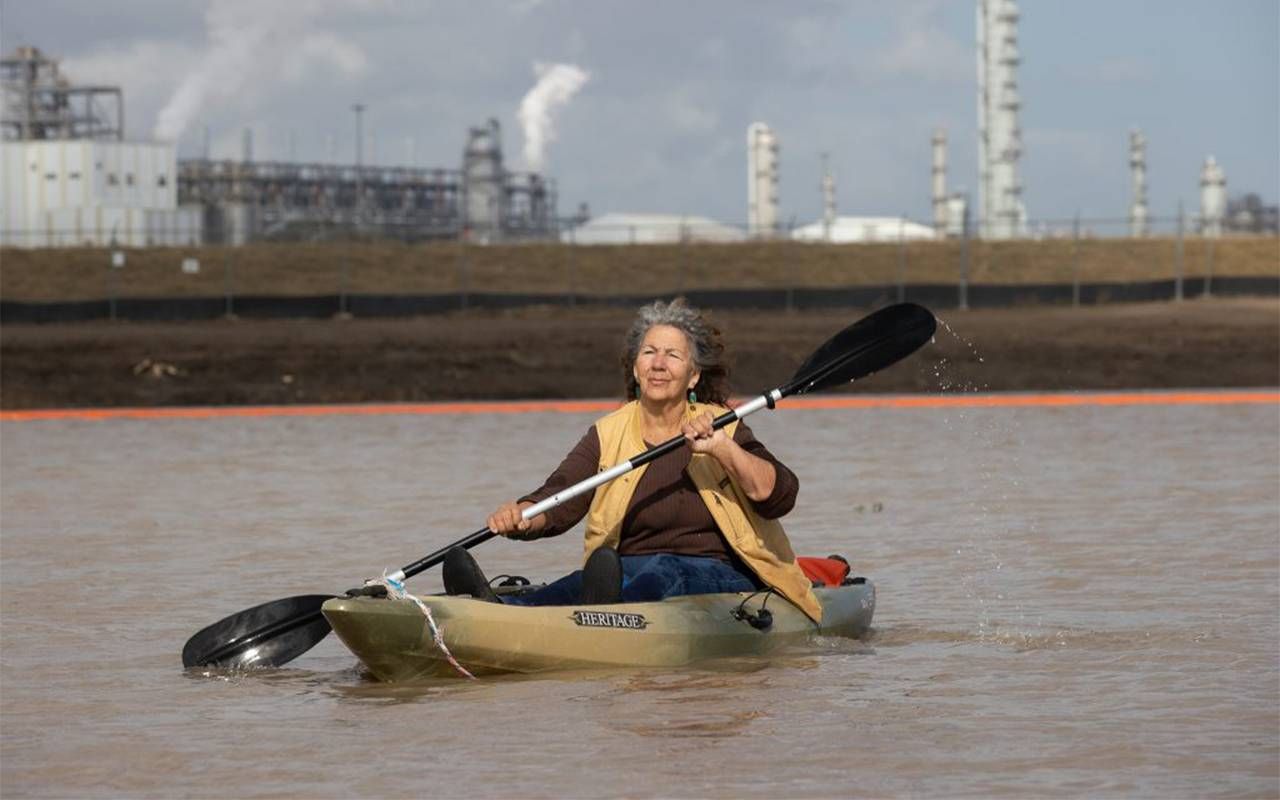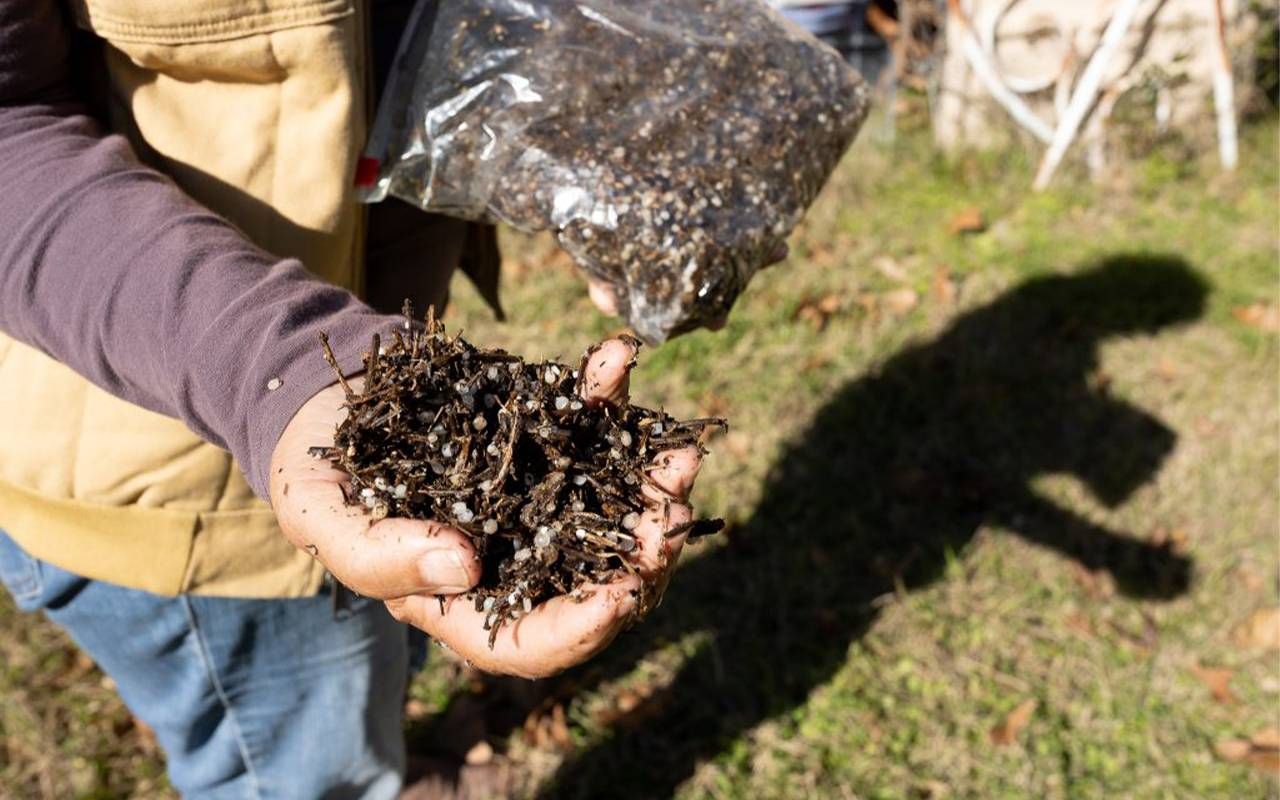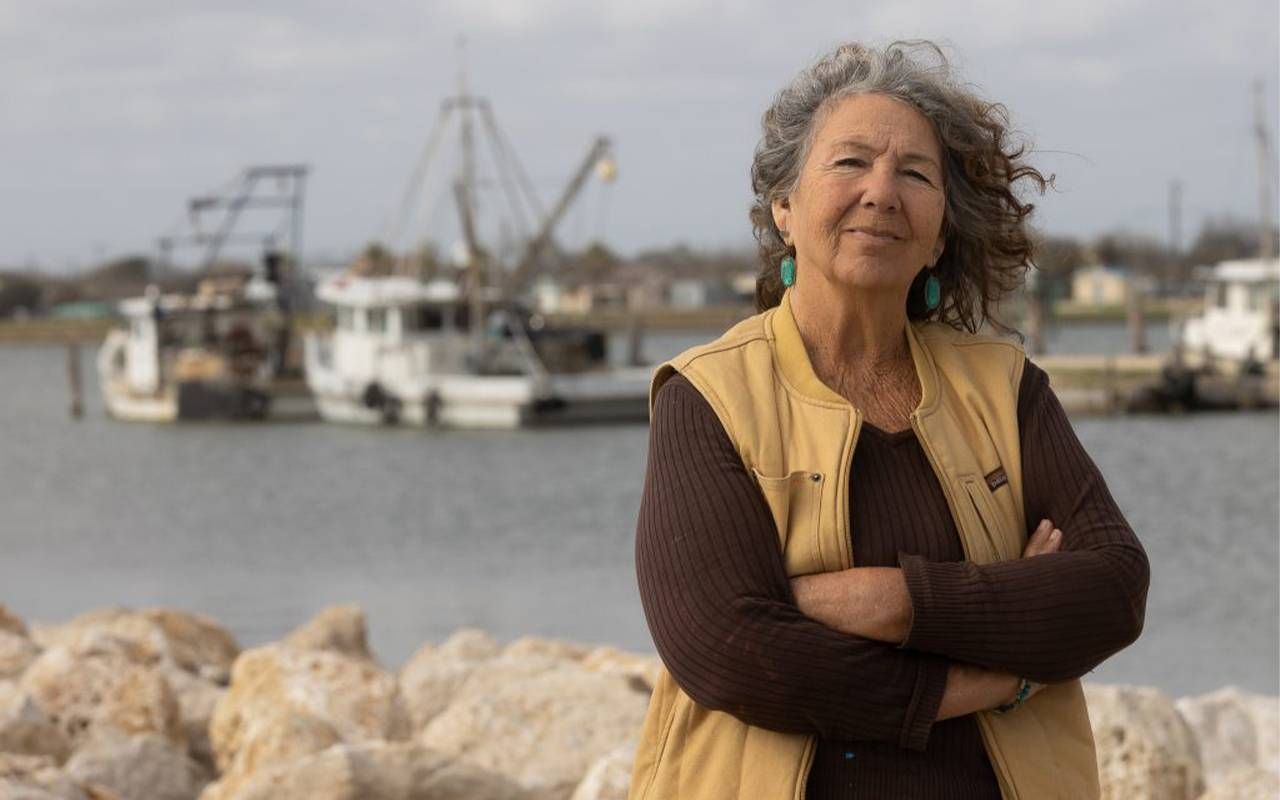You’re Never Too Old to Help Save the Planet
Diane Wilson, a Texas shrimper, spent three decades battling a plastics factory that was polluting the bay where her family has worked for generations
Diane Wilson, 74, was a shrimper in the tiny Gulf Coast town of Seadrift, Texas, when she read in a newspaper that her county was rated the most toxic in the country. At first, she got mad. Then she got even.

Wilson, who was then a 40-year-old mother of five kids ranging in age from 2 to 12, went toe-to-toe with Formosa Plastics, battling the company, one of the world's biggest petrochemical concerns, for illegally dumping plastic waste into Lavaca Bay.
"I suddenly felt I had to stand up for myself."
The bay, which is about halfway between Houston and Corpus Christi, happens to be where Wilson, like four generations before her, did their shrimping until the pollution got too bad and the shrimp population collapsed. Her private war with Formosa Plastics stretched on for 34 years, eventually attracting help and inside tips from former Formosa workers and whistleblowers.
The battle ended in December 2019, when Formosa agreed to settle Wilson's lawsuit for $50 million, the biggest award against a polluter in a citizen lawsuit in the history of the Clean Water Act. It also promised to achieve "zero-discharge" of plastic waste from its plant in Point Comfort, Texas.
Further, Formosa Plastics agreed to pay to restore damaged wetlands, beaches and waterways, and to pay penalties until its discharges ended.
Public Insults, Anonymous Threats
Along the way, lots happened to Wilson. Constant insults. Threats. Cloak-and-dagger meetings with whistleblowers from the Taiwan-based giant. Someone killed her dog. Someone sabotaged her boat; she almost sank with it. Her employer fired her. Her marriage broke up. She was jailed over 50 times.
Was it worth it? You bet, she answers.
"Something really shifted for me – I suddenly felt I had to stand up for myself," Wilson says. "I believe everyone has a destiny, something they're meant to do." At some point in one's life, a clue or bit of information will come up, she adds. "You have a choice – you either do it or you don't. For most people, 'stepping out' is a huge void, and it's scary."
"Few people in this world deserve to be called heroes," a Booklistreview said about Wilson in a review of her memoir, "An Unreasonable Woman." (The title paraphrases a George Bernard Shaw quote about how progress depends on unreasonable people.)
The Most Toxic County in the U.S.
The fourth-generation fisher is one of six Goldman Environmental Prize winners in 2023. The prize is awarded to grassroots leaders who take major action to protect the environment, often at personal risk.
The other 2023 winners are from Indonesia, Turkey, Brazil, Finland and Zambia. The prize, funded by Rhoda Goldman, an heir to the Levi Strauss fortune, and her husband Richard, an insurance executive, has been awarded since 1990 in San Francisco.
Wilson's story began in 1989: She was in the fish house when a fellow shrimper showed her a front-page newspaper story calling Calhoun County the most toxic county in the U.S. She'd noticed how her shrimp catch was dropping drastically and the season was dwindling. "Then, all the dolphins started dying," she recalls.
Shrimp Once Were Big There
Texas has 46 petrochemical plants on its Gulf Coast, and the region gained the macabre nickname "Cancer Alley." But the thriving local seafood industry once had 120 shrimp boats, five fish houses, two to three seasons, each several weeks long, and — back in 1930 — Point Lavaca, the county seat, was the top shrimp port in the country, she notes.
"So, totally out of character — by nature I'm a quiet, shy person — I decided to call a meeting about this. I went to City Hall to reserve a room," she says. "The next day, a lady in a nice dress came to our smelly fish house to say, 'You can't have a meeting — there are just too many red flags.'"
Wilson said then she'd hold it at the grade school. She was told: Don't do it at all.
Pushback in Pinstripes
"The next day, the bank president came in a three-piece suit to our fish house to say, 'Are you fixing to start a vigilante group to roast industry alive?'" Wilson, who had never spoken to him before, was dumbfounded. But she held the meeting anyway, then another. Chamber of Commerce folks and county mayors came and disrupted things, she says.
"They said I don't know how to run a meeting, I was just a hysterical woman," she recalls. "Formosa Plastics sent a stenographer to write everything down and a video camera. People told my husband, 'I wouldn't want my wife to do what your wife is doing.'"
"People told my husband, 'I wouldn't want my wife to do what your wife is doing.'"
Wilson organized demonstrations, press conferences and civil disobedience. "My first hunger strike was just me on my boat, two weeks long. A local TV reporter came, and asked, 'Who do we quote? We were told not to quote you.' That would give me authority," she says. "The company's regulatory affairs guy came by and said, 'Look at that stupid woman.'"
After she found a lawyer willing to work pro bono, Formosa Plastics hired him. "When you start causing trouble with a company, they find out your allies and start going after them," Wilson explains.
Nevertheless, She Persisted
As she carried on, conscientious Formosa Plastics workers began calling her with information on the plant's toxic practices and constant flouting of the law, from falsified data to frequent leaks and spills, and their health problems.
The plant produces tiny resin pellets out of chemicals, including vinyl chloride, a known carcinogen. Formosa's customers use the pellets to make plastic products such as water bottles, carpet and car parts, and didn't have a system to prevent their discharge into the water. When marine creatures and birds eat the tiny round white pellets, which resemble fish eggs, they often starve to death.

Wilson formed volunteer teams to collect the pellets in the environment; they found them on and by the shore almost daily and documented their work with photographs and videos. She founded and led San Antonio Bay Estuarine Waterkeeper and Calhoun County Resource Watch.
"The first time a man called me anonymously, he wanted to meet, but was real cautious as he didn't want to be seen. I didn't trust him, and he didn't trust me," Wilson says. "So I had a P.I. (private investigator) meet me in the Walmart parking lot."
The P.I. brought a tape recorder so she could surreptitiously capture what was said when she met the caller but warned her that the recorder would start to beep when it was full, in about 45 minutes. "You don't want it beeping," he said, and then followed her at a safe distance.
"Then more people started calling — almost all carried guns," she remembers. "There was a lot of fear. People came up to my husband to say, 'Can't you control her'?"
Intimidation Turns Ugly
In the Netflix documentary series Dirty Money, which aired a "Point Comfort" segment in 2020, one former employee described retaliation he experienced after reporting violations to the EPA: He said four men beat him up and shots were fired past his home. A contractor witness said that when he opened his mailbox one day, he found inside a photo of his daughter and the head of a dead chicken, the bodyguard hired to protect him told Wilson after watching the film.
After helicopters started hovering above her house at night, Wilson slept next to a shotgun. After her husband saw one in the front yard, and someone in it shot and killed their dog, the sheriff's deputy accused him of making it up. "'You're just having a Vietnam flashback. And if your wife ever gets sick, we're going to put her in the loony bin,'" she recalls. "Our dog was taken to the vet. He removed two bullets."

The turning point was when she went to Texas Rio Grande Legal Aid in 2015, and found two sympathetic lawyers. Environmental lawyer Amy Johnson was hired to be the lead lawyer in the Federal lawsuit against the company for Wilson and her San Antonio Bay group.
On the first day of the trial, Wilson brought to court 2,400 resin pellets and a phalanx of expert witnesses that included a marine biologist, storm water expert, ex-employees of Formosa Plastics and a former official of the Texas Commission on Environmental Quality..
The judge found Formosa to be a "serial offender" guilty of "extreme, historical and repetitive" violations of the Clean Water Act.
Changed Her Forever
Wilson speaks almost mystically about her love for the bay. "I've always been around the bay and boats," she says. "For me, when they go after the bay, it's like they're going after a living being that's kin to me. I sensed her presence since I was a child and want to keep her safe." She also talks about how the experience changed her forever.
"For me, when they go after the bay, it's like they're going after a living being that's kin to me."
She's still at it: She leads regular patrols to monitor the shoreline for pellets. On October 31, she began another hunger strike in front of the Formosa plant, spurred by a Formosa steel plant's disastrous release of toxic chemicals into the sea in Vietnam. The calamity affected more than 179,000 people, damaged marine life and provoked lawsuits from almost 8,000 victims.
The hunger strike began in a protest organized by the International Monitor Formosa Alliance, which Wilson co-founded with Sharon Lavigne, executive director of RISE St. James in Louisiana (a 2021 Goldman Prize winner) and Justice for Formosa Victims founder Nancy Bui of Austin.
"If you're not afraid, then you're doing something mighty comfortable and mighty safe. It's when you start to be afraid you know you're probably walking your path," says Wilson (see video of her here). "I never liked myself so well or felt more free. You're never too old to save the planet."
Read More

